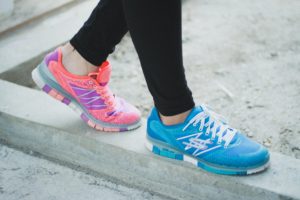Cadence, shoes, foot strike, and injury prevention are hot topics among runners. Whether you want the hard science or the overwhelming anecdotal evidence, we break down what you need to know to make strides in today’s podcast episode.

Some topics in the running world never get old. Why? Because studies, trends, and mindsets are constantly evolving.
For example, the book Born to Run, not intentionally trying to sell you on barefoot running, started the minimalist footwear revolution. If you were running a decade ago, it’s likely that you were swept up in this monumental shift.
If you came out unscathed and still run after your barefoot days, perhaps you took on the maximalist shoes years later. As athletes push their sports, science often plays catch up to verify or disprove various theories.
Today I’m excited to bring on a guest who is not only passionate about all the intricacies of running, but he is also well researched and practiced in the sport.
Chris Napier Explains the Science
Chris Napier quite literally wrote the book on the Science of Running. He is a professor of Physical Therapy at the University of British Columbia in Vancouver as well as a practicing physiotherapist, 2:33 marathoner, and medal winner at the Canadian Track & Field Championships in 1996 and 1997.
Chris earned his diploma in Sport Physiotherapy and has a PhD in Running Biomechanics and Injury Prevention. With his academic background, Chis shares his knowledge on what the research has proven out and what we’ve learned from experience.
In this conversation, we talk about:
- Who should modify their cadence and when
- Why foot strikes are better left alone
- Benefits of logging more than your running stats
We also cover the myths that never die:
- Running is bad for your knees
- Static stretching prevents injuries
- Endurance runners should lift for endurance
- Certain types of shoes can help you prevent injuries
Chris is passionate about educating runners to make wise decisions in their training and recovery and offers actionable advice, as you can hear below:
Chris also shares his top 2 tips for staying healthy while running:
- Listen to your body to prevent injuries and make training modifications as needed
- Do heavy and intentional resistance training
To hear more details or this and all the other topics we cover, check out the full episode below.
Subscribe to the podcast in Apple Podcasts, Spotify, Stitcher, iHeartRadio, or Google Play.
Links & Resources from the Show:
- Connect with Chris on Twitter
- Check our our free course on injury prevention
Thank you Precision Hydration!
Thank you to our newest sponsor, Precision Hydration. If you’ve ever struggled with hydration or electrolyte issues, use code STRENGTH15 to get 15% off your first order. They offer tablets, packets, and other essentials to help you train in any environment.
Precision Hydration knows that there isn’t a one-size-fits all approach to hydration, which is why I love that they help athletes refine their hydration strategy for whatever event they’re training for. If you can’t get a custom sweat test done, they have a free online test that will give you your own personalized hydration strategy.
It’s heating up where I am and I’m ending my runs a lot sweatier than I was just a month ago. I know I’ll be paying a lot more attention to my hydration and electrolyte needs. This is especially important with longer runs in the mountains here at altitude.
You can learn much more about hydration in my conversation with the founder of Precision Hydration, Andy Blow.
Check out Precision Hydration and get 15% off your first order of electrolytes that match how you sweat by using the code “STRENGTH15”.